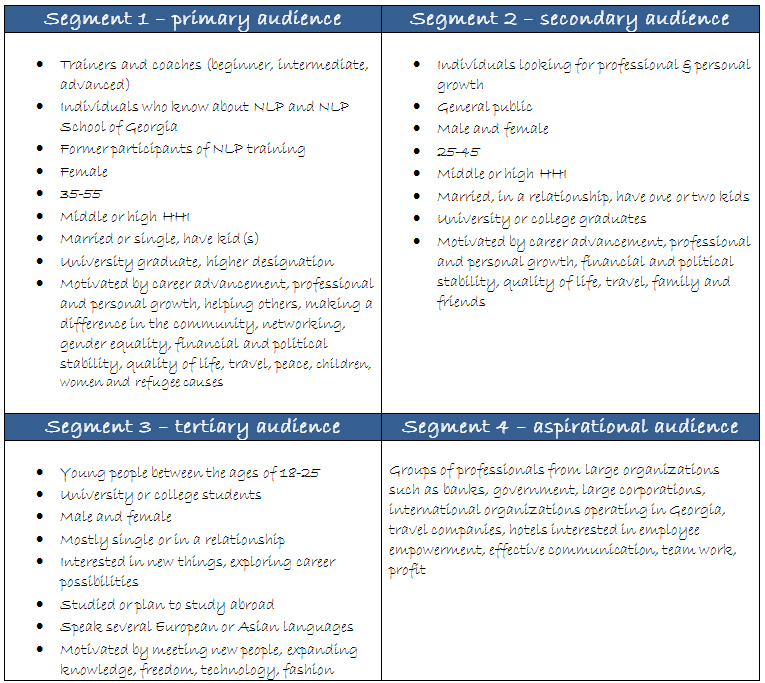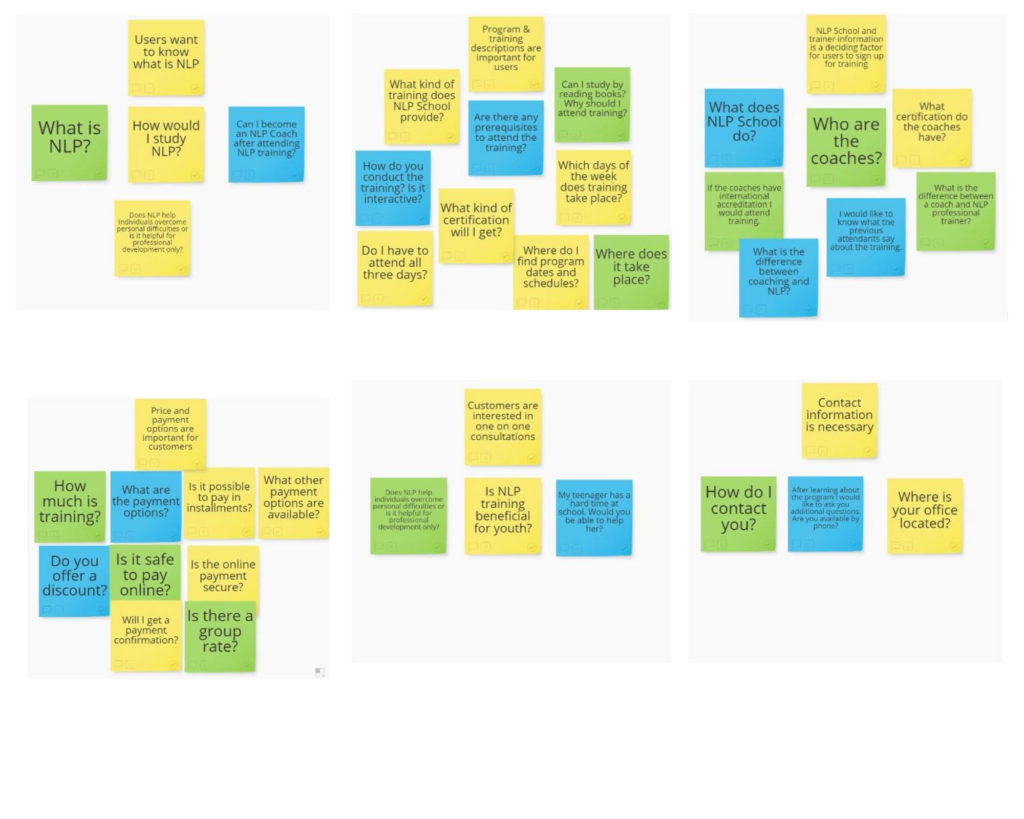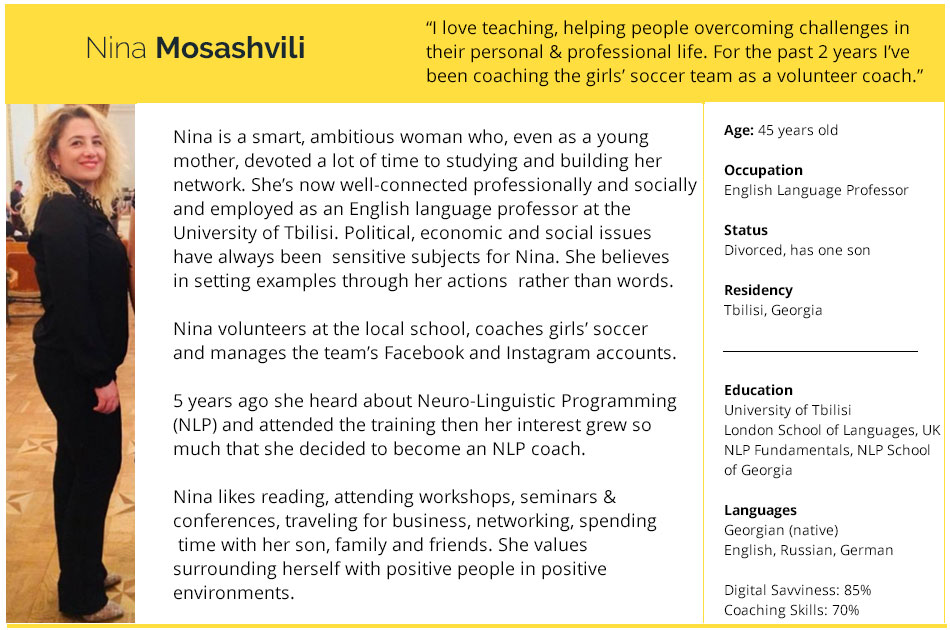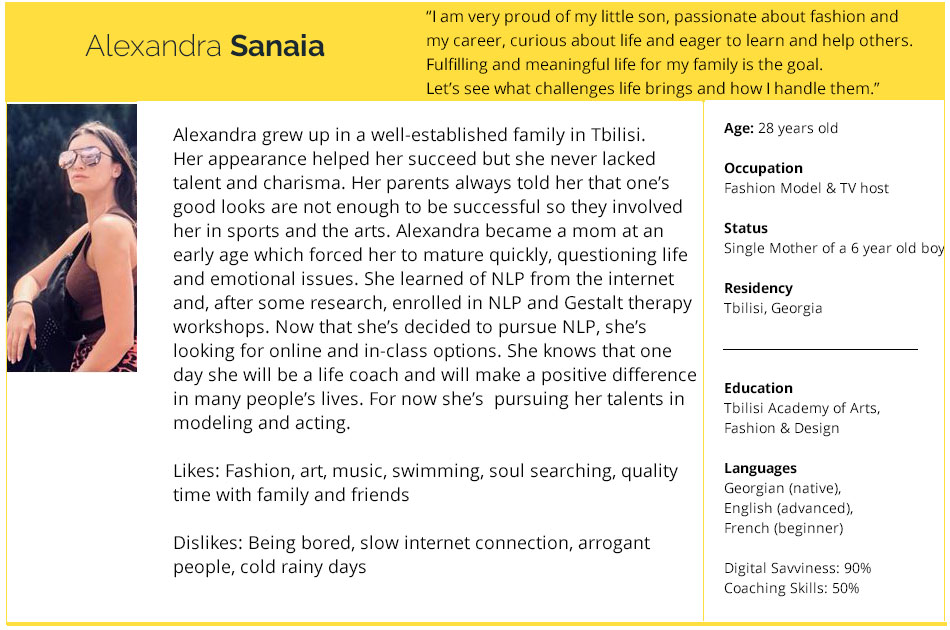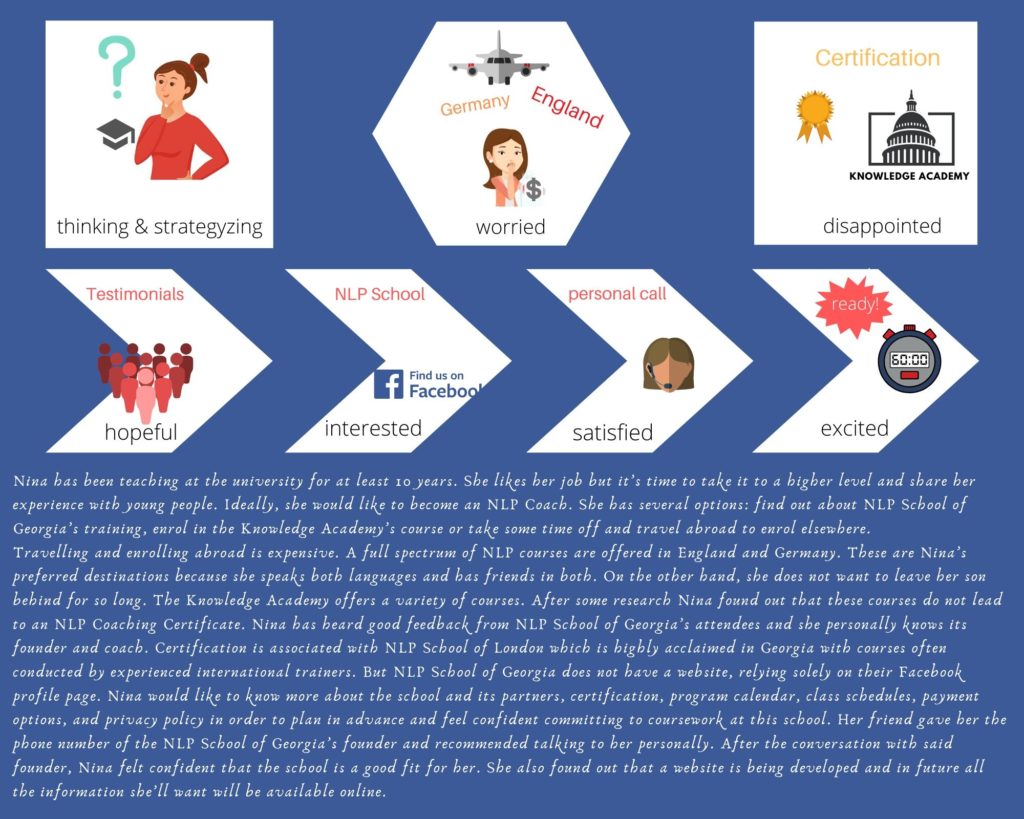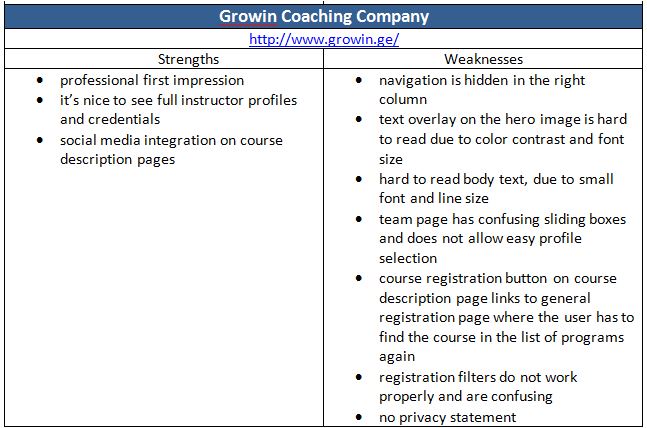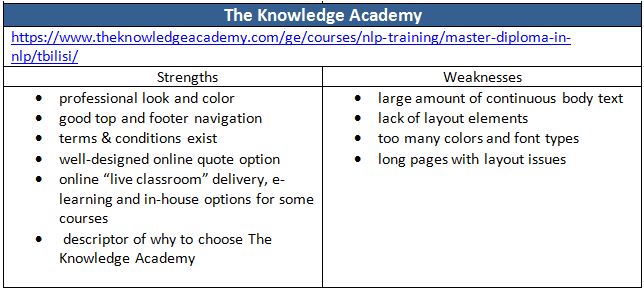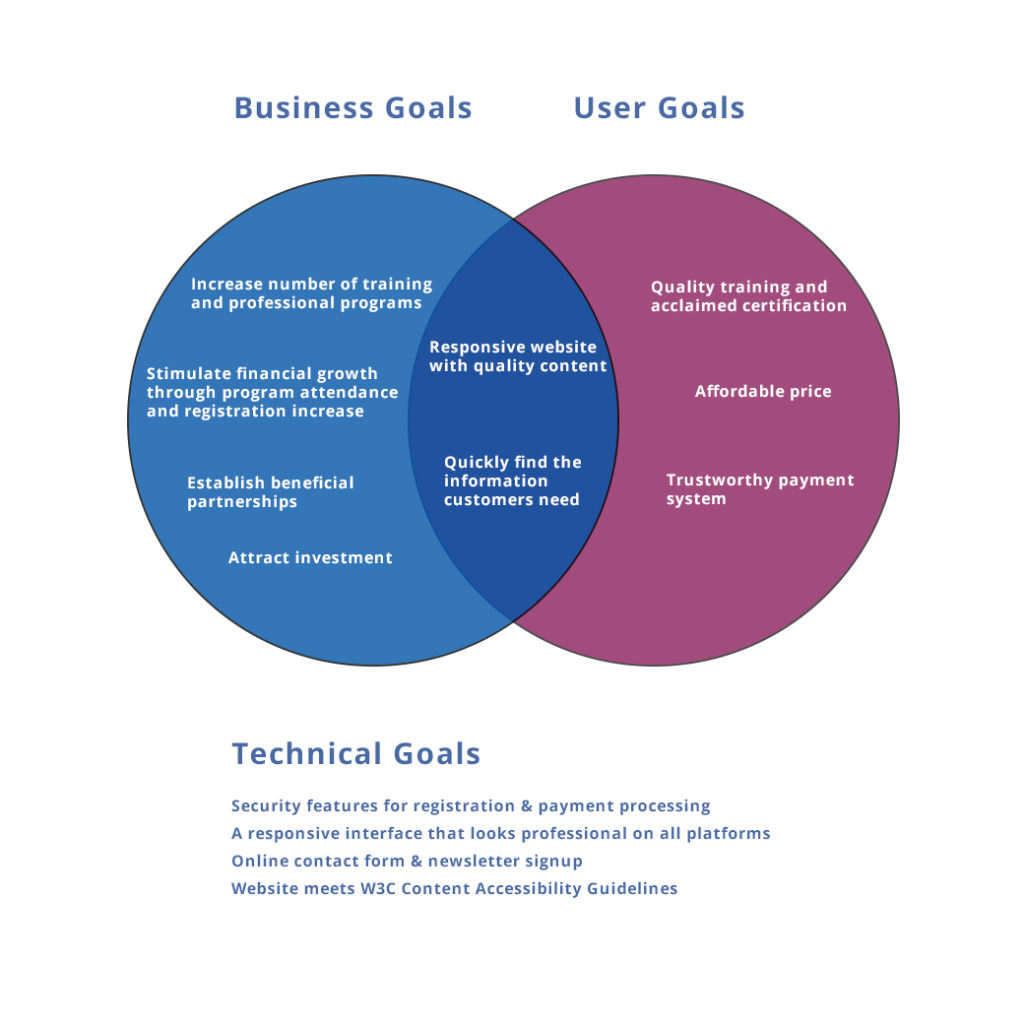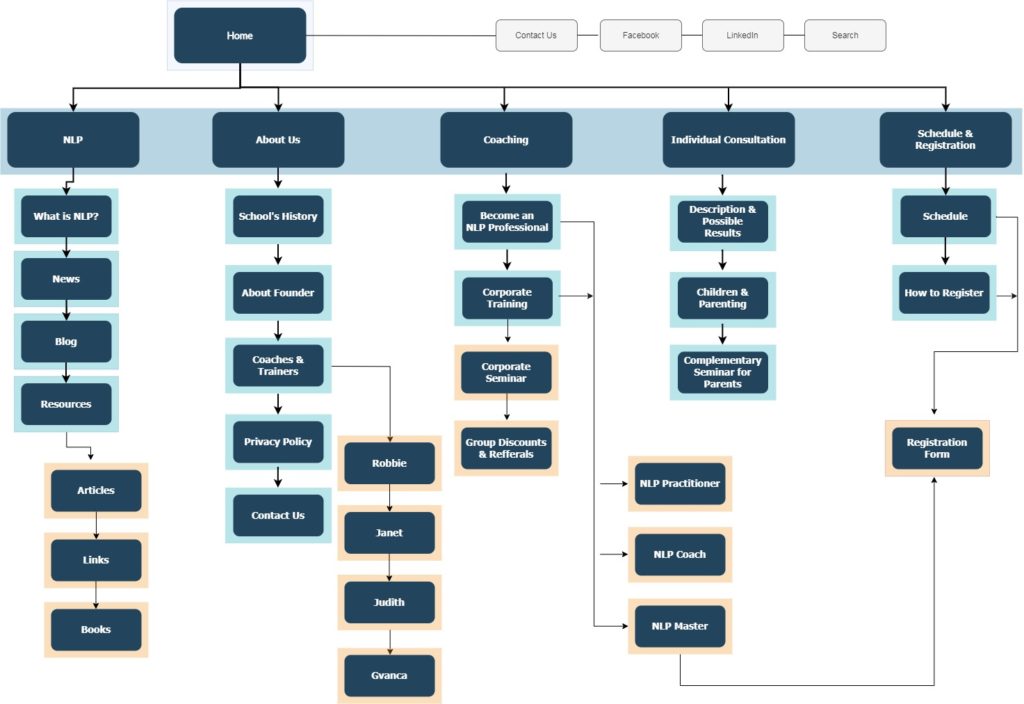UX Design Process
The Client
NLP School of Georgia is a leader in delivering NLP Practitioner and Generative Coaching programs in Georgia. NLP stands for Neuro-Linguistic Programming. Learning NLP is like learning the language of your own mind.
The school is relatively new, founded in Tbilisi in January, 2018. It is in the process of development and growth and as a UX Designer, I’m assisting in the evolution of the company by defining its mission, vision, goals and brand awareness, through customer research and brainstorming exercises with stakeholders. We held a couple of discussions about the brand: describing adjectives and keywords, researched the competitor landscape, along with obstacles to overcome, audience segments and persona profiles.
Currently the school does not have a website. Classes and events are promoted through Facebook, LinkedIn, TV ads, TV interviews and referrals/word of mouth.
The Product
Design a responsive, usable and aesthetically appealing website to help the NLP School of Georgia to: increase brand awareness; number of training and professional programs; establish beneficial partnerships; and attract new customers and investors.
Research
Research Phase 1
During my research I looked at the viability of a website as an integral part of an online presence for NLP School of Georgia. Based on my general research, here are some benefits of having a web presence:
Attracting customers
- a professionally designed website raises trust and legitimacy of the brand (and increases brand awareness)
- website appears in Google search results
- allows for permanent access to ever-changing/updated information and materials vs. ever-changing information on social media and advertising platforms
- customers expect it
Helping stakeholders
- cost-effective solution for advertising, customer communications, targeting a wider audience, partners and investors
- accessible around the clock
- showcases the company and controls its narrative
Furthermore, in order to determine – specific to the Georgian customer – both the importance of having a website and how comfortable they are using online payment methods, I researched our primary audience segment (identified during stakeholder interviews in Research Phase 2) by developing a questionnaire which resulted in four Georgian respondents (three women and one man). The questionnaire included the following areas of study:
- Understanding people’s common behaviours when looking for emotional and professional development (word of mouth vs. Facebook vs. online research).
- Determining people’s preferences for registering and paying for educational events.
- The aspects that make an online source successful, useful and trustworthy.
- Determining what people like and dislike about their online experiences.
I divided the responses into three basic groups and identified what elements are important for users, including content and design, to enhance user engagement.
How do users research products & services?
“I Google the subject matter and look at the websites.”
“I look for the information in Google search; I look for schedule, price, provider, their background, customer feedback.”
“I research information online and ask friends and acquaintances. When I am looking for something specific I search by specific key words. When I am reading an article and run into something interesting which I’ve never heard before, I research the subject matter online.”
“I will check the company’s Facebook page, but I will definitely do online research to verify.”
“Social media presence is not enough; I always look for the company’s website for complete information.”
“I will purchase products or services from a company’s social media page, but it depends on the price. If the price exceeds $500, I need more information before making the purchase.”
What makes an online resource trustworthy & legitimate?
“The quality of the look and functionality, ease of use, whether it looks cheap, fake or sophisticated. ‘Under construction’ sign lowers my evaluation of the online resource.”
“I pay attention to the delivery of information. Does it sound professional? How well do they answer my questions?”
“When I read the first sentence and I am drawn to reading more, I am interested. It should be written in clear simple language.”
“Overall visual design and the quality of the site. I often look it up on my mobile and see how well it is designed for cell phones.”
What do users do or buy online?
“I often use internet banking for purchasing train, airplane, opera and movie tickets at biletebi.ge, afisha.ge or ticket.ge.
Many of my friends & acquaintances make yoga class and swimming pool payments online in advance.”
“If I am interested in the services or product, I will sign up for a newsletter. I will also call and speak to someone.”
“I shop online for food, clothes, and even courses.”
“I will return to the website if I am interested in other services or new information, as well as the address and the phone number and will follow up with a phone call and order by phone if possible. Ordering dry wall, for example. First I called, identified the product, ordered it and received it at home. Visually it is easier to find products on the website. Sometimes it’s not easy to spot a product in the store. Looking at the website gives me an opportunity of price comparison, saves time, energy and effort.”
“If I want to attend training, I will research the coach and program online. I will meet with the coach in person if possible. I will ask my friends, acquaintances and co-workers if they’ve attended any of the training and get their opinion.”
Research
online research
Google
website
key words
research by subject
read articles
ask friends
read testimonials
do not rely solely on social media
personally contact people
personal meeting
save time and effort
Content
schedule
price
company info or background
coach / trainer information
quality answers to their questions
meaningful content
clear, straightforward language
testimonials
complete information
address
phone number
price comparison
Design
visual design
functionality
typography
responsive
Research Phase 2
- Stakeholder Interviews
- Understanding of user demographics, opportunities, challenges and expectations
- Competitive Analysis
- Valuable data collection re: the school’s audience segments, during stakeholder interviews
At stakeholder interviews I collected valuable information about the school’s audience segments.
I attended and completed a “Mindful Business Leadership” course and observed instructor-participant behaviour and the specifics of the training at the NLP School of Georgia.
Audience Segments
Male and female, high school, college or university graduates, tech savvy, live in Georgia
Age groups: 25 – 35, 36 – 45, 46 – 55
User Interviews
To better understand the prospective users I interviewed four people within the scope of the target audience and prepared the summary of my interpretations.
What Users Told Us?
Needs of the Target Audience
Grouping interview responses allowed me to identify user needs.
- Users learn about personal and professional growth and NLP practices through online and website research; sourcing information on social media is not enough.
- Determinants of perceived trustworthiness of the site included sophisticated design, simple clear communication, seamless functionality and ease of use. In some cases for the user, the first sentence is a deciding factor to engage or not with the website.
- Repeated business users refer to the website for additional information and willingly subscribe to newsletter or updates.
- Users value coaching delivered by internationally accredited NLP trainers and practitioners.
- NLP Certification is important to them.
- Quality of the training is the most important consideration for enrolment.
- Affordable price is one of the deciding factors.
- Users are comfortable using an online payment method if the payment service is well known/established and they’ve used it for other past purchases (e.g. events tickets, travel, etc.); some users identified trustworthy URLs commonly used in Georgia.
Through usage of all the qualitative data collected during the stakeholder interviews and after determining the needs of the target audience, I created primary and secondary personas.
Storyboard
This storyboard describes Nina’s struggle to get certification on a budget and the solution that NLP School and its website will provide.
Storyboard or Nina’s journey
Nina has been teaching at the university for at least 10 years. She likes her job but it’s time to take it to a higher level and share her experience with young people. With her son getting older, she has more time for thought and growth, so she would like to take the opportunity and enhance her knowledge in NLP. Nina has attended one NLP Course at NLP School of Georgia and taken a Personal Development Training at Headvice. Ideally she would like to become an NLP Coach. She has several options: find out about NLP School of Georgia’s training, enrol in the Knowledge Academy’s course or take some time off and travel to another country.
Travelling abroad is expensive. A full spectrum of NLP courses are offered in England and Germany. These are Nina’s preferred destinations because she speaks both languages and has friends in both countries. On the other hand, she does not want to leave her son behind for that long.
The Knowledge Academy offers a variety of courses. After some research, Nina learned that these courses do not lead to an NLP Coaching Certificate.
Nina has heard good feedback from NLP School of Georgia’s attendees and she personally knows its founder and coach. Certification is associated with NLP School of London which is very desirable in Georgia. Training is often conducted by experienced international trainers. NLP School of Georgia does not have a website. The school relies fully on a Facebook page. Nina would like to know more about the school and its partners, certification, program calendar, class schedules, payment options, the privacy policy (for her advanced payment planning), and feel confident committing to training at this school.
Her friend gave her the phone number of the NLP School of Georgia’s founder and recommended talking to her personally. After such a conversation, Nina felt confident that the school was a good fit for her. She also found out that a new website is being developed, so in future all the information she needs will be available online.
The final product is in development.
